With four presentations at this year’s annual conference of the European Media Management Association (emma2022) in Munich, the KomMa team was particularly prominently represented at one of the most important international associations in the field of media management in Europe.
This time, KomMa-professor Harald Rau and his team members Naomi Nowak and Per Ole Uphaus presented, among other things, especially for the conference in Munich selected and further detailed results of their comprehensive international Delphi study on the future of location-based services as well as a resulting methodological critique of this study. Both approaches were discussed in detail during scheduled presentations as well as in a so called ‘paper development workshop’, regularly part of emma’s annual conferences. In their study, the choice of the Delphi method, as well as the dispersity of the sample, allowed the researchers to explore interdisciplinary perspectives while discussing the topic with some of the most internationally renowned experts in the field of LBS. The exchange at emma2022 was not only insightful but also especially welcome after various conferences in the last year could not take place or were held online only due to the Covid19 pandemic.
Interested in the topic and you would like to know more about the research on location based content in media management? Feel free to write to pe.uphaus@ostfalia.de!
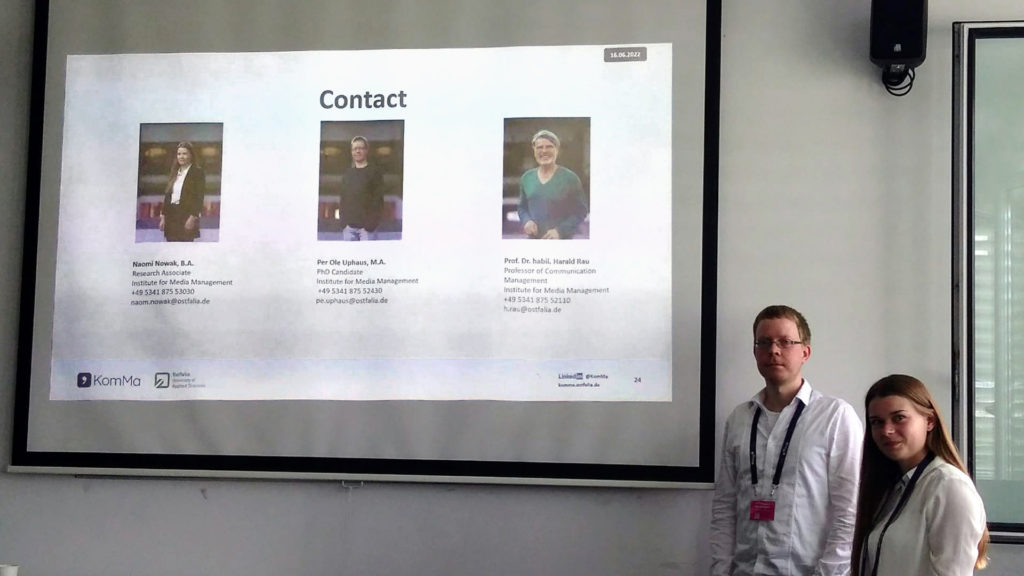
The KomMa team would like to thank the organizers Castulus Kolo, Joschka Mütterlein and Florian Haumer, as well as all attendees of emma2022 for an amazing conference. Furthermore, our special thanks go to Joaquín Cestino for his valuable input during the paper development workshop.
Here you can find deeper insights into one of the presented topics:
Abstract
Ongoing and rapid digital transformation processes are affecting businesses as well as our entire society, with business model innovations causing radical changes in consumer behavior (Mäkiö et al 2018; Skog et al. 2018). Users nowadays increasingly expect a constant availability of high-quality, real-time digital services (Mergel et al. 2019; Verhoef et al. 2021). Consequently, one of the core questions in this context seems to be which kind of technologies may endure in the near- and long-term future. With an ever-increasing demand for flexible, mobile and fast ways of communication, users also expect digital media offerings to be specifically customized according to their situational and spatial context (Peters 2016; Quy Tran et al. 2018). Since location has been identified as a key factor in predicting user behavior (Karimzadeh et al. 2018), the future potential of location-based media applications in today’s mobile information era is considered particularly high (Huang et al. 2018). With ‘location-based services’ (LBS) a user’s mobile device can be geographically localized in order to provide content tailored to the user’s current context (Junglas & Watson 2008; Raper et al. 2007; Schnabel 2009). Thus, the deployment of LBS is predestined to meet the current digital transformation of media industries – however, despite their huge potentials as a ‘lasting’ technology, the future of LBS is still considered to be uncertain due to continuous technological developments (Thomas & Thampi 2011), such as “new forms of visualisation beyond maps, such as 3D, VR, and augmented reality” (Huang et al. 2018).
This contribution aims to identify innovations that can be realized through the use of localization technologies with high future potential in various sectors of LBS usage. Previous research has so far mostly targeted this field from an IT-related perspective while social scientific traditions and approaches appear to be rather underrepresented (Authors 2020). Thus, this contribution’s findings are based on a Delphi study of two iterations addressing personal assessments of relevant international LBS-experts from a scientific or an entrepreneurial background. While this initial Delphi study was mainly aimed at providing a general look into the future of LBS – in order to derive future developments, solutions for current obstacles and impulses for future research – this contribution is specifically devoted to one subsection of the dataset generated in the Delphi study, that was discussed unexpectedly intensively by almost all participants: the aforementioned technologies with high future potential as well as their purposes and possible application areas.
The advantages and disadvantages of the Delphi method are widely discussed in social sciences: It enables the mapping of group opinions, ensures that the reputation of the experts is transferred to the study results, and can furthermore be seen as a procedure to curb bias by balancing individual biases of the experts (Steinmüller, 2019, p. 34). The quality of a Delphi study depends on clearly formulated research questions, a heterogeneous sample of competent experts, and a well-designed questionnaire (ibid.), and the most common problem seems to be that too many Delphi studies are based on poor design and an insufficient theoretical basis (Häder & Häder, 1998). The study selected for this contribution of methodological critique was some kind of a culmination of a series of previous research (Rau & Ehlers, 2017; Uphaus et al., 2019; 2021). The interviewers were thus able to draw on a wealth of previously generated knowledge, which runs directly counter to the methodological fundamental critique mentioned above. As an example, the study is here to show how suitable the method could be implemented to foster management decisions in media enterprises. By its wider angle on the market realities of a bottom-up technology, the contribution will show how media management research is able to directly support management’s decisions in the media.
Literature
Häder, M., & Häder, S. (1998). Neuere Entwicklungen bei der Delphi-Methode: Literaturbericht II (1998/05). DEU; Mannheim. https://www.ssoar.info/ssoar/handle/document/20051
Huang, H., Gartner, G., Krisp, J. M., Raubal, M., & van de Weghe, N. (2018). Location based services: ongoing evolution and research agenda. Journal of Location Based Services, 12(2), 63–93.
Junglas, I. A., & Watson, R. T. (2008). Location-based services. Communications of the ACM, 51(3), 65–69.
Krusch, A.-L. C., Uphaus, P. O., & Rau, H. (2020). Only Location: A Systematic Literature Review on Context Marketing. In 2020 IEEE International Symposium on Technology and Society (ISTAS), 2020 (pp. 204–209).
Karimzadeh, M., Zhao, Z., Gerber, F., & Braun, T. (2018). Mobile Users Location Prediction with Complex Behavior Understanding. In 2018 IEEE 43rd Conference on Local Computer Networks (LCN). Piscataway, NJ: IEEE.
Mäkiö, J., Miroliubov, A., & Zhgun, V. (2018). Digitalization – quo vadis? SHS Web of Conferences, 44, 56.
Mergel, I., Edelmann, N., & Haug, N. (2019). Defining digital transformation: Results from expert interviews. Government Information Quarterly, 36(4), 101385.
Peters, C. (2016). Spaces and Places of News Consumption. In T. Witschge, C. W. Anderson, & D. Domingo (Eds.), The SAGE Handbook of Digital Journalism (pp. 354–369). London: SAGE.
Quy Tran, H., van Phan, C., & Vien, Q.‑T. (2018). An Overview of 5G Technologies. In K. V. Arya, R. S. Bhadoria, & N. S. Chaudhari (Eds.), Emerging Wireless Communication and Network Technologies: Principle, Paradigm and Performance (pp. 59–80). Singapore: Springer.
Raper, J., Gartner, G., Karimi, H., & Rizos, C. (2007). A critical evaluation of location based services and their potential. Journal of Location Based Services, 1(1), 5–45.
Rau, H., & Ehlers, A. (2017). “Location Based Services” – alles eine Frage der Akzeptanz. In W. Seufert (Hrsg.), Media Economics revisited – (Wie) verändert das Internet die Ökonomie der Medien (S. 257-283). Baden-Baden: Nomos.
Schnabel, Christoph (2009): Datenschutz bei profilbasierten Location Based Services: Die datenschutzadäquate Gestaltung von Service-Plattformen für Mobilkommunikation. Kassel: Kassel University Press.
Skog, D. A., Wimelius, H., & Sandberg, J. (2018). Digital Disruption. Business & Information Systems Engineering, 60(5), 431–437.
Steinmüller, K. (2019). Das „klassische“ Delphi: Praktische Herausforderungen aus Sicht der Zukunftsforschung. In M. Niederberger & O. Renn (Eds.), Delphi-Verfahren in den Sozial- und Gesundheitswissenschaften: Konzept (pp. 33–54). VS Verlag für Sozialwissenschaften.
Thomas, D., & Thampi, S. M. (2011). Mobile Query Processing-Taxonomy, Issues and Challenges. In A. Abraham (Ed.), Advances in Computing and Communications: First International Conference, ACC 2011 (pp. 64–77). Berlin: Springer.
Uphaus, P. O., Neuper, O., Beringer, B., Hoffmann, L., Langenmair, S., Ehlers, A., & Rau, H. (2019). Barriers seen by potential local Providers of Applications using Location-Based Services. In G. Gartner & H. Huang (Eds.), Adjunct Proceedings of the 15th International Conference on Location Based Services (LBS 2019) (pp. 251–258). Vienna: Research Group Cartography.
Uphaus, P. O., Ehlers, A., Beringer, B., & Rau, H. (2021). Business Model Innovation in Local Journalism – how do Local Media Managers Perceive and Recognise Technical Opportunities? Manuscript Submitted for Publication.
Verhoef, P. C., Broekhuizen, T., Bart, Y., Bhattacharya, A., Qi Dong, J., Fabian, N., & Haenlein, M. (2021). Digital transformation: A multidisciplinary reflection and research agenda. Journal of Business Research, 122, 889–901.

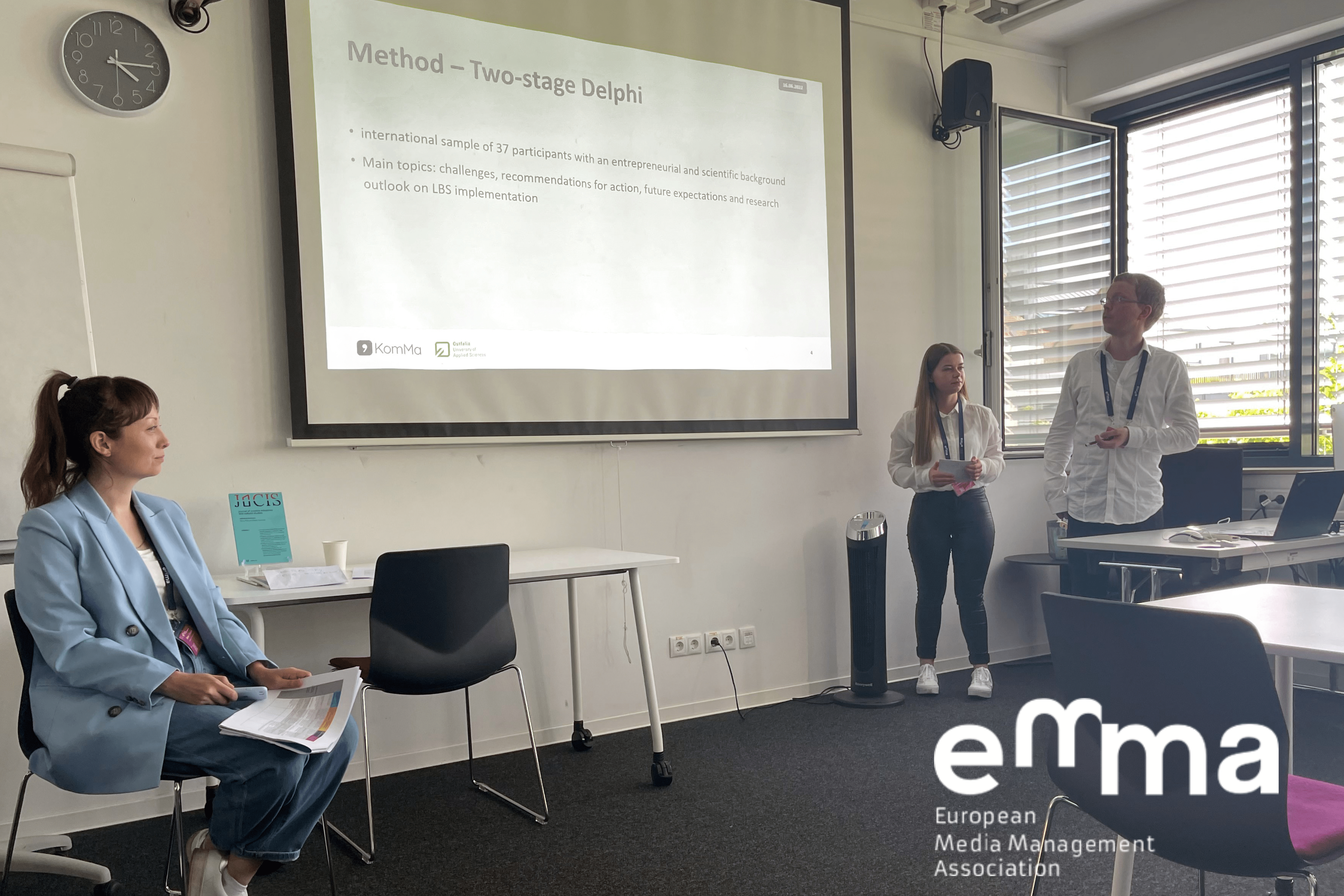

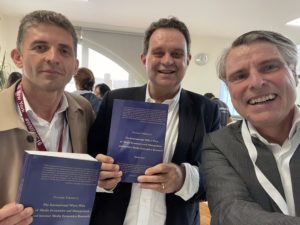
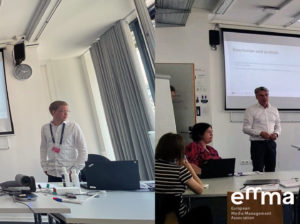
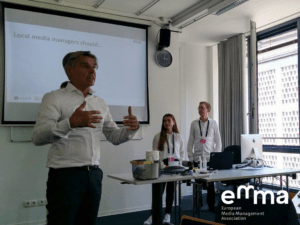
Noch kein Kommentar, Füge deine Stimme unten hinzu!